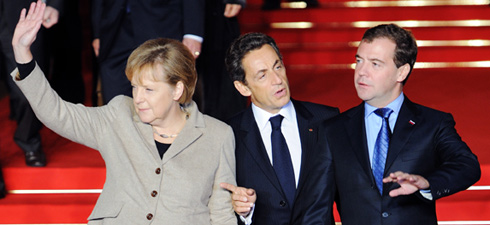The security summit this week between Nicolas Sarkozy, Angela Merkel and Dmitry Medvedev was always likely to be a non-event. France wanted something spectacular, Germany something reasonable, Russia something it could trade. So, the chances of a meeting of minds were slim. But the gathering at Deauville in northern France could turn out to be a non-event with consequences. When historians look back, this may be seen as the moment when leaders faced up to the fact that they are living in a multipolar Europe.
The very fact that the summit was held marks an end to the European Union’s solipsism. During the 1990s, many thinkers believed that Europe was becoming a “postmodern” continent, which no longer relied on a balance of power. National sovereignty and the separation of domestic and foreign affairs were deemed much less important. The EU and Nato would gradually expand until all European states were bound into this way of doing things. Until recently, it looked like that was happening. Central and eastern Europe were transformed, Georgia and Ukraine saw displays of pro-western people power, and Turkey moved steadily towards accession.
But now the prospects for this unipolar European order are fading. Russia, which was never comfortable with Nato or EU enlargement, is powerful enough to call openly for a new security architecture. Turkey, frustrated by the way in which some EU states have blocked membership negotiations, is increasingly pursuing an independent foreign policy and looking for a larger role. Add to this the fact that the US – its hands full dealing with Afghanistan, Iran and the rise of China – has ceased to be a full-time European power and you can see the multipolar Europe looming. Read full article at the European Council of Foreign Relations site...
Seen from Slovakia
A new German-French imperialism
Exclusive summit meetings like that took place this week in the northern French town of Deauville between Nicolas Sarkozy, Angela Merkel and Dmitry Medvedev arouse suspicion, writes political scientist Jana Kobzová of the European Council on Foreign Relations. Multi-polar Europe must not be lead in an imperial manner by its major powers, Kobzová comments in the liberal daily SME: "Deauville made a name for itself in the 19th century as a seaside resort at a time when the powerful states had divided Europe into spheres of influence. The meeting reminds one of such arrangements between the powerful, from Bismarck to Talleyrand. ... Europe today ... faces problems for which it lacks a solution mechanism. There's no shortage of topics for discussion. The question that remains, however, is what will change for Europe's security after this discussion in Deauville to which the leaders of France, Germany and Russia invited neither 90 percent of the states of Europe nor the increasingly important player Turkey. ... The problem is not just the meeting in Deauville, but also the trend we're seeing. The EU threatens to return to the times when it was divided among the spheres of influence of Europe's major powers. Nothing good for the multi-polar continent can come of that." (with eurotopics)
Was this article useful? If so we are delighted!
It is freely available because we believe that the right to free and independent information is essential for democracy. But this right is not guaranteed forever, and independence comes at a cost. We need your support in order to continue publishing independent, multilingual news for all Europeans.
Discover our subscription offers and their exclusive benefits and become a member of our community now!












